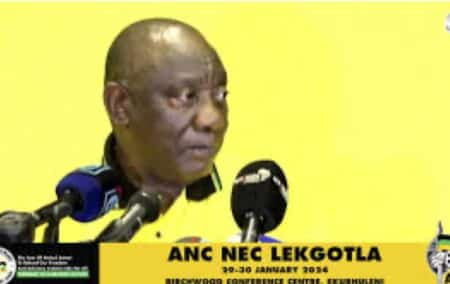The Free Speech Union of SA (FSU SA) has urged South Africans to be vigilant in monitoring ANC claims about a ‘fightback’ or ‘regime change agenda’ from critics of South Africa’s position on Israel.
The FSU SA notes in a statement that in closing the ANC’s National Executive Committee (NEC) lekgotla last week, President Cyril Ramaphosa said: ‘The fightback may also focus on our domestic politics, and our electoral outcomes, in order to pursue a regime change agenda.’
It says Ramaphosa ‘is deploying a propaganda strategy as old as time, and reminiscent of former President Jacob Zuma’s “White Monopoly Capital” slur.
‘The purpose is to misattribute any possible failure of the ANC’s fortunes in the upcoming election.’
The FSU SA says the right to freedom of speech ‘is being exercised, as it should, but the obligation to use it wisely is being flouted’.
It adds that ‘citizens and civil society must be alert to the risks and expose them fearlessly’.
The statement notes: ‘As journalist Ivo Vegter has written in the Daily Friend, this strategy involves establishing that “a group of people, foreign or domestic, have nefarious intentions towards the country, thereby directing the attention of the people away from the record of the incumbents in government… Creating such an enemy, and pre-emptively accusing them of dirty tricks and election interference, positions the ANC to reject any and all challenges to its incumbency as an Israeli plot.”
‘Vegter describes this as an open “blame-the-Jews strategy”. The aim is to denounce the ANC’s political enemies as “agents of their supposed ‘genocidal apartheid state’”.
The FSU SA notes that, on 31 January, the Minister of International Relations and Cooperation, Naledi Pandor, accused Israel of ignoring the ‘U.N.’s top court by killing hundreds more civilians in a matter of days in Gaza’.
‘Pandor relied on unverified figures from Hamas’s Health Ministry in Gaza. These figures never distinguish between Hamas operatives and civilians.
‘In a reference to the Rwandan genocide of 1994, Pandor said: “We are allowing this to happen again, right before our eyes, on our TV screens.”
In an interview by Stephen Sackur on HardTalk on 30 January, on the question of the rise of anti-Semitism in South Africa, Minister of Justice and Correctional Services Ronald Lamola said: “And in South Africa there is no threat, harm whatsoever to the Jewish people. They continue to participate in all forms of social life.”
When Sackur raised the concerns of non-executive chairman of the SA Jewish Report Howard Sackstein – “I sit here staring at my suitcase, contemplating whether it’s time to leave the only home I’ve ever known… Everything has an expiry stamp, and South Africa is looking like we’re fast approaching the ‘best before date’”, Lamola replied: “As you speak to me now, nothing has happened to him and nothing will happen to him or any Jewish community on the basis of their creed, sex or religion….”
In response to Sackur’s comment that there had been a rise in anti-Semitic attacks since October 7, Lamola said: “No…There’s no such. As I’m speaking to you today the President wrote in his weekly newsletter…which was very clear that our action is not [on] basis of anti-Semitism. It is on basis of our obligation as a nation believing in human rights to stand for the vulnerable children of Palestine. So there is no anti-Semitism in South Africa against the Jewish people…”.
On 31 January, the SA Jewish Board of Deputies issued a press release claiming that antisemitic incidents in 2023 reached the highest levels since 1993, when it began compiling figures. “For Oct-Dec 2023 there were 139 recorded incidents compared to 19 over the same period in 2022, an increase of 631%.”
The FSU SA concludes: ‘In an election campaign in which the ANC can say nothing good about its own governance, South Africans ought to listen carefully to what it does say.’

